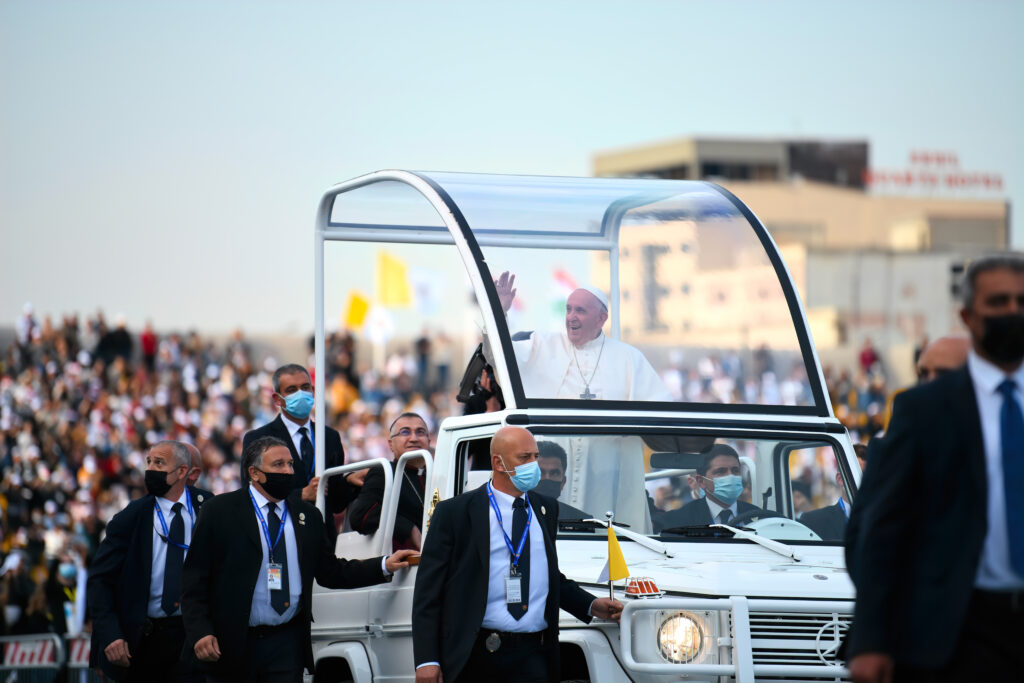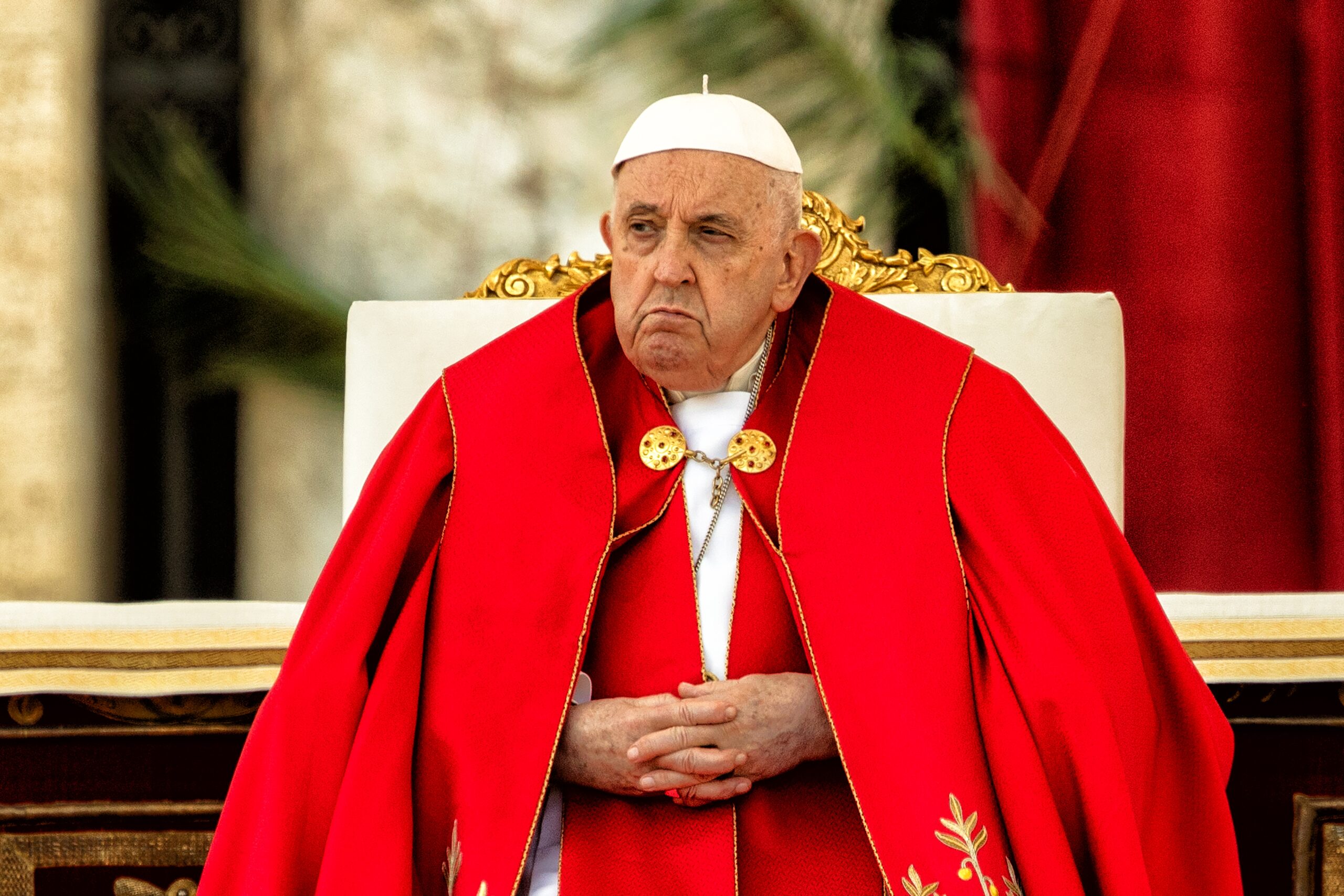Pope Francis visited Singapore for three days on a 12-day tour of four Southeast Asia and Oceania nations. The pontiff praised Singapore’s multi-faith nature at an interreligious meeting at a Catholic junior college, saying that “all religions are a path to God.”
“They are like different languages in order to arrive at God, but God is God for all,” the pope said in an extemporaneous speech. “Since God is God for all, then we are all children of God.”
“If you start to fight, ‘my religion is more important than yours, mine is true, and yours isn’t’, where will that lead us?” he asked aloud. “There’s only one God, and each of us has a language to arrive at God. Some are Sheik [Sikh], Muslim, Hindu, Christian, and they are different paths [to God].”
The pope’s choice of religions does not reflect the religions in Singapore, the most prominent of which is Buddhism, with a plurality of 31.1% of the population declaring themselves as adherents. People with no religious affiliation (atheist, agnostic or other irreligious life stances) form the second largest group at 20% of the population. Christianity comes in at 18.9%, followed by Islam at 15.6%, Taoism at 8%, and Hinduism at 5%. Sikhs are a minority ethnic community in Singapore, making up 7,000– 12,000 out of Singapore’s four million total population.
While the pope specified that Sikhs, a decided minority, have a “language to arrive at God”, he did not mention Judaism. There are estimated to be 10,500 Jews living in Singapore, approximately equal to (or surpassing) the number of Sikhs.
Pope Francis began his tour with a visit to Jakarta, Indonesia, home to the largest Muslim population in the world. In Jakarta, the pope met with Indonesia’s grand imam, Nasaruddin Umar, along with representatives of the six officially recognized religions in Indonesia: Islam, Buddhism, Confucianism, Hinduism, Catholicism, and Protestantism. He encouraged Indonesians of every religious tradition to “walk in search of God and contribute to building open societies, founded on reciprocal respect and mutual love, capable of protecting against rigidity, fundamentalism, and extremism, which are always dangerous and never justifiable.”
“I encourage you to continue along this path so that all of us, all of us together, each cultivating his or her own spirituality and practicing his or her religion, may walk in search of God and contribute to building open societies …”
Some Catholics criticized Pope Francis for expressing religious pluralism in contravention of classical Christian theology, which professes that the only path to God is through belief in Jesus. The Catholic Church teaches that the “goodness and truth” found in non-Christian religions can be seen as a “preparation for the Gospel.” Catholic Culture described comments on religions being different paths to one God as “an argument that seemed clearly in conflict with the constant teaching of the Catholic Church.” American Bishop Joseph Strickland, who was removed as the Bishop of Tyler under Pope Francis, urged fellow Catholics to “pray for Pope Francis to clearly state that Jesus is the only Way.”
David Nekrutman is a theologian, author, Jewish advisor to The Chosen, and Executive Director of The Isaiah Projects. He prefaced his comments by noting that “Pope Francis is not really accepted within the conservative side of the Catholic Church.”
“Pope Francis is the first non-European head of the Catholic Church in over 1,200 years,” Nekrutman emphasized. “He is not a theologian like Pope John Paul II and Pope Benedict. Francis’s understanding of Judaism is the cultural Judasims of Argentina, usually divorced from Zionism. He understands the Jews in the diaspora. He doesn’t understand the Jew in the context of the fullest expression of what it means to be a Jew as a nation, stewarding the Land of Israel under the sovereignty of God.”
Nekrutman noted that Pope Francis has worked to enhance Christian-Muslim relations. In 2019, Francis and Mohammed VI, King of Morocco, signed a statement about Jerusalem, referring to Israel’s capital as Al-Quds Acharif, the Arabic name for Jerusalem. This minimizes the distinctive relationship between Jerusalem and the Jewish people.
#PopeFrancis is welcomed to #Morocco by King Mohammed VI on Saturday. https://t.co/3hRWQh0quR pic.twitter.com/vlIzHrlDiH
— Vatican News (@VaticanNews) March 30, 2019
“Francis sees Judaism through the lens of Liberation Theology,” Nekrutman said. Liberation Theology defines Christianity as a human rights movement focused on improving the lot of the oppressed. This is expressed through Pope Francis emphasizing issues of social justice such as war, migration, and climate change.
“Most previous popes and mainstream Christians see Jews through the lens of Covenant Theology, which has the roots of Christianity in Judaism and the covenant between God and the Jews focused on the Land of Israel.”
This was clearly expressed in 2021 when Francis became the first pope to visit Iraq. While there, he hosted an inter-religious prayer service at a ziggurat. The structure is an ancient Mesopotamian site built in the 21st century BCE built on the purported site of the city of Ur, the birthplace of Biblical Abraham. The prayer event was named “Prayer for the sons and daughters of Abraham.”

The event was attended by Christians, Muslims, Mandaean-Sabaean, Yazidi, and other religious minorities present in Iraq.
But no Jews were invited to attend.
Nekrtuman explained that the Catholic Church and Judaism have a long and complex history of cooperation and conflict and have had a strained relationship throughout history, with periods of persecution, violence, and discrimination directed towards Jews by Christians, particularly during the Middle Ages, based on theological conflict. Anti-Jewish sentiment reached its zenith with the murderous racial antisemitism of the Nazi Holocaust.
This changed on October 28, 1965, when, under Pope Paul VI, the Vatican signed the Nostra Aetate, Latin for “in our time.” The document dealt with issues that were problematic between Jews and the Church and also those that prevented open and friendly relations between Catholicism and other religions, including Hindus, Buddhists, and Muslims. To some extent, the Nostra Aetate absolved the Jews of guilt for the killing of Jesus, referred to as Jewish deicide.
“Not all of the Catholic Church internalized the changes instituted by the Nostra Ataete,” Nekrutman said. “Most notably, the Catholic Church of Latin America and the Middle East don’t necessarily subscribe to the tenets of the Nostra Ataete. They do not see Jews in the covenant and as stewarding the land.”





